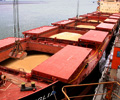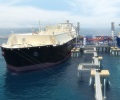
South Korean and Thai refiners are hesitant to import CPC Blend crude from the Mediterranean market because the Israel-Hamas ceasefire agreement does not guarantee the safety of shipments in the Red Sea, industry and trade sources said on January 20-21.
Iran-backed Houthi militants say they will only target ships with strong ties to Israel following a ceasefire deal in Gaza between Israel and Hamas.
However, many Asian crude buyers believe that security risks for tanker shipping around the Red Sea have not diminished, and shipping insurance costs remain high, said Singapore-based traders and feedstock managers at South Korean and Thai refiners.
According to an official at South Korea’s top oil refiner, SK Innovation, there is no absolute guarantee that tankers will sail safely through the Red Sea region for deliveries to Asia. CPC Blend crude oil, along with all other types of Mediterranean crude oil, still has to travel the longer Cape of Good Hope route, making it inefficient and expensive.
CPC Blend crude oil was first shipped from production facilities to Russia’s Black Sea port of Novorossiisk via the Tengiz-Black Sea pipeline, which stretches 1,500 km. Prior to the Israeli-Hamas tensions, these ships usually sailed through various maritime routes, including the Black Sea, Mediterranean, Suez Canal, Red Sea, Indian Ocean and South China Sea before reaching ports in North and Southeast Asia.
South Korea’s CPC Blend crude oil imports have fallen sharply over the past year; and light, sweet Kazakh crude are unlikely to feature prominently in future feedstock procurement baskets for now due to unattractive cracking economics and high logistics costs, SK Innovation officials said.
In the second half of 2024, South Korea imported 17,000 b/d of CPC Blend crude oil, down 63% from the first half of last year and 75% less than the 69,000 b/d it purchased in the second half of 2023, according to the latest data from Korea National Government-run Oil Corporation. SK Innovation and Hyundai Oilbank are regular buyers of CPC Blend crude oil in Asia, and South Korea is the largest importer of light sweet crude oil in Asia.

Thai imports
Thailand bought about 1,805 b/d of CPC Blend crude in 2023, but refiners in Southeast Asia’s second-largest oil consumer avoided Kazakh light sweet crude in 2024, according to the latest data from Thai customs.
“CPC Blend has never really been a primary feedstock for Thailand’s refinery system, and it doesn’t make sense to invest and take such a big risk for a small additional feedstock option like this,” said a feedstock management source at a Thai government-owned refinery.
Platts, part of S&P Global Commodity Insights, values CPC Blend on a CIF Augusta basis at a discount of $1.955/b to the Dated Brent strip as of Jan. 20. Those discounts have averaged $1.6/b so far in January, compared with an average discount of 88 cents/b in December 2024.
Although buying interest in CPC Blend crude oil in the Mediterranean market is weak, Thailand continues to source various types of light and sweet crude oil from Libya and Azerbaijan.
El Sharara, Mesla Blend and Mellitah condensates from Libya, as well as Azeri Light from Azerbaijan, are usually shipped on Suezmax or smaller tankers that pass through the Suez Canal and Red Sea routes before reaching their Far Eastern destinations, raw material management sources in Thailand and This was revealed by an Indonesian refining company.
Refining and trade sources in Southeast Asia indicate that to mitigate logistics risks associated with shipping Mediterranean and North African crude, there is an option to divert such cargoes to West African ports. Here, the barrels can be loaded together onto VLCC tankers along with Nigerian and Angolan crude oil, which will then travel to the Far East via the Cape of Good Hope route.
Source: Platts




